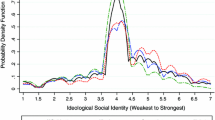Abstract
This research examines the relationship between citizens' assessments of how much influence the group they identify with is able to exercise in American politics and their subjective political competence and political participation. Appraisals of group influence have a powerful effect on subjective political competence, fulfilling theoretical expectations outlined by Leon Festinger many years ago. Moreover, assessments of group influence affect individuals' decision concerning membership in an interest group that promotes the interest of one's reference group. The work reported here is an improvement over past efforts in that it explicitly defines and assesses the causal importance of a concept that has been featured in prior research.
Similar content being viewed by others
References
Abramson, Paul (1983).Political Attitudes in America. San Francisco: Freeman and Co.
Balch, George I. (1974). Multiple indicators in survey research: The concept “sense of political efficacy.”Political Methodology 1: 1–43.
Campbell, Angus, Philip E. Converse, Warren E. Miller, and Donald E. Stokes (1960).The American Voter. New York: Wiley.
Chong, Dennis (1991).Collective Action and the Civil Rights Movement. Chicago: University of Chicago Press.
Conover, Pamela (1984). The influence of group identifications on political perception and evaluation.Journal of Politics 3: 139–166.
Converse, Philip E. (1972). Change in the American electorate. In Angus Campbell and Philip E. Converse (eds.),The Human Meaning of Social Change. New York: Russell Sage.
Craig, Stephen C. (1979). Efficacy, trust, and political behavior: An attempt to resolve a lingering conceptual dilemma.American Politics Quarterly 7: 225–239.
Craig, Stephen C., Richard G. Niemi, and Glenn E. Silver (1990). Political efficacy and trust: A report on the NES pilot study items.Political Behavior 7: 289–314.
Elster, Jon (1985). Rationality, morality, and collective action.Ethics 96: 136–155.
Festinger, Leon A. (1947). A theory of social comparison processes.Human Relations 7: 117–1440.
Fiorina, Morris P., and Kenneth A. Shepsle (1989). Is negative voting an artifact?American Journal of Political Science 33: 423–439.
Frohlich, Norman, Joe A. Oppenheimer, and Oran R. Young (1971).Political Leadership and Collective Goods. Princeton NJ: Princeton University Press.
Hardin, Russell (1982).Collective Action. Baltimore: Johns Hopkins University Press.
Koch, Jeffrey W. (1987). Electoral context and political preference: A perspective from reference group theory. Unpublished doctoral dissertation, University of Michigan, Ann Arbor.
Levine, John M., and Richard L. Moreland (1987). Social comparison and outcome evaluation in group contexts. In J. C. Masters and W. P. Smith (eds.),Social Comparison, Social Justice, and Relative Deprivation. Hillsdale, NJ: Erlbaum.
Moe, Terry M. (1980).The Organization of Interests: Incentives and the Internal Dynamics of Political Interest Groups. Chicago: University of Chicago Press.
Muller, Edward, and Karl-Dieter Opp (1987). The rationality of collective action.American Politcial Sicence Review 81: 557–564.
Olson, Mancur, Jr. (1965).The Logic of Collective Action. Cambridge, MA: Harvard University Press.
Opp, Karl-Dieter (1986). Soft incentives and collective action: Participation in the anti-nuclear movement.British Journal of Political Science 16: 87–112.
Ornstein, Norman J., and Shirley Elder (1978).Interest Groups, Lobbying and Public Policy. Washington, DC: Congressional Quarterly Press.
Rothenberg, Lawrence (1988). Organization Maintenance and the Retention Decision in Groups.American Political Science Review 82: 1129–1152.
Uhlaner, Carole J. (1989a). “Relational goods” and participation: Incorporating sociability into a theory of rational action.Public Choice 62: 253–285.
Uhlaner, Carole J. (1989b). Rational turnout: The neglected role of groups.American Journal of Political Science 33: 390–422.
Verba, Sidney, and Norman Nie (1972).Participation in America. New York: Harper and Row.
Author information
Authors and Affiliations
Rights and permissions
About this article
Cite this article
Koch, J.W. Assessments of group influence, subjective political competence, and interest group membership. Polit Behav 15, 309–325 (1993). https://doi.org/10.1007/BF00992100
Issue Date:
DOI: https://doi.org/10.1007/BF00992100




